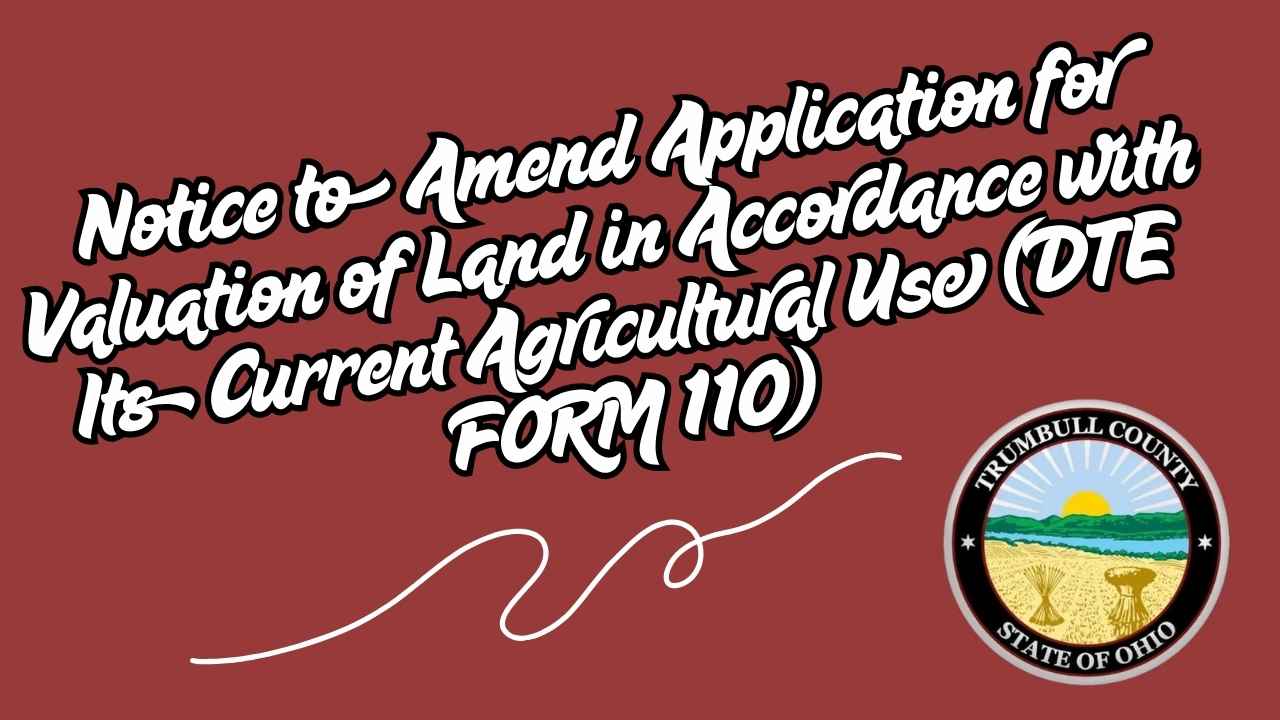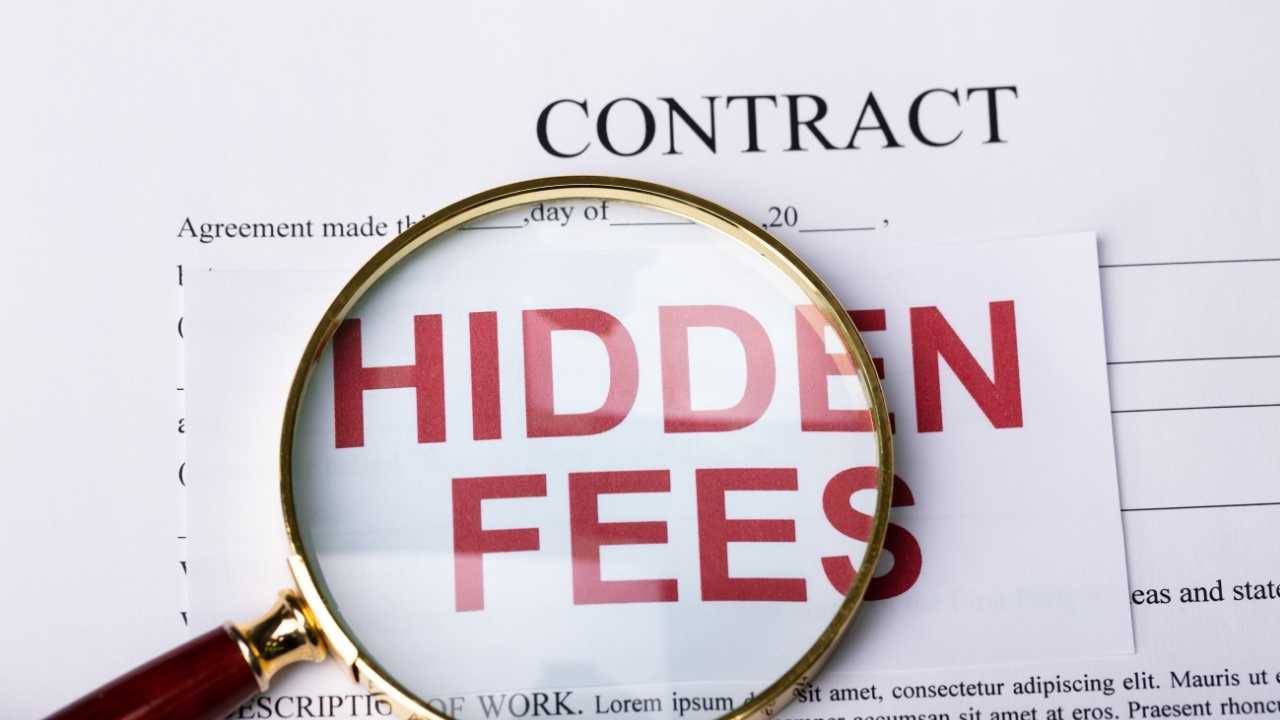In Trumbull County, Ohio, the Notice to Amend Application for Valuation of Land in Accordance with Its Current Agricultural Use (DTE Form 110) is used. It updates or corrects details in an existing application for the Current Agricultural Use Valuation (CAUV) program.
This form helps farmland keep its tax savings by showing changes in its use. Let’s look at what this form is, why it’s important, and how it helps farmers and landowners in Trumbull County.
What Is the CAUV Program?
The CAUV program in Ohio values land based on its agricultural productivity, not market value. This makes farming more affordable by lowering property taxes. Trumbull County landowners use DTE Form 110 to update their CAUV applications when changes happen.
Why Use DTE Form 110?
DTE Form 110 is needed for updates to a CAUV application, like changes in land use or ownership. Filing this form keeps the CAUV status active and accurate. It helps farmers keep benefiting from lower taxes.
Who Needs to File DTE Form 110?
Landowners in Trumbull County’s CAUV program must file DTE Form 110 for changes in their land’s use. This includes farmers, agricultural tenants, or property owners with qualifying land. The form is filed with the Trumbull County Auditor’s Office.
Eligibility for the CAUV Program
To qualify for CAUV, land must meet Ohio law criteria. The land must be at least 10 acres or generate $2,500 in annual agricultural income if smaller. It must be used exclusively for commercial agriculture.
Key Eligibility Requirements:
- Land must be devoted to commercial agricultural production.
- Minimum of 10 acres or $2,500 in gross income for smaller parcels.
- Must be actively farmed for the past three years.
When to File DTE Form 110
DTE Form 110 should be filed for changes in land use, ownership, or other details affecting CAUV eligibility. The deadline is usually before the first Monday in March each year. Check with the Trumbull County Auditor for exact dates.
How to File DTE Form 110
Filing DTE Form 110 is easy but requires careful attention. Landowners can get the form from the Trumbull County Auditor’s website or office. It can be submitted in person, by mail, or electronically.
Steps to File DTE Form 110:
- Download or pick up the form from the Auditor’s Office.
- Complete all sections with updated information.
- Submit the form by the deadline, either online or in person.
What Happens After Filing?
After submitting, the Trumbull County Auditor reviews DTE Form 110. If the land qualifies for CAUV, the updated valuation is applied to property taxes. If not, a notice (DTE Form 112) explains why.
Why CAUV Matters in Trumbull County
Trumbull County has rich farmland, and CAUV helps farmers keep costs low. By reducing property taxes, the program supports agricultural businesses. This is key for the county’s economy and food production.
Property Taxes in Trumbull County
Property taxes in Ohio are 35% of a property’s appraised value. For CAUV land, this value is based on agricultural productivity, not market rates. This can lead to significant tax savings for farmers.
CAUV vs. Market Value Taxation
| Valuation Type | Basis | Tax Impact |
|---|---|---|
| CAUV Valuation | Agricultural productivity | Lower taxes |
| Market Valuation | Fair market value | Higher taxes |
Common Changes Requiring DTE Form 110
Several changes may prompt the need to file DTE Form 110. These include shifts in land use, ownership transfers, or changes in acreage. Keeping records updated ensures continued tax benefits.
Examples of Changes:
- Converting part of the land to non-agricultural use.
- Transferring ownership to a new farmer or entity.
- Adjusting the acreage enrolled in CAUV.
Consequences of Not Filing
Failing to file DTE Form 110 when changes occur can lead to loss of CAUV status. This may result in a recoupment fee, equal to the tax savings from the prior three years. Land will then be taxed at market value.
How CAUV Values Are Calculated
CAUV values are set by the Ohio Department of Taxation every three years. They consider soil type, crop prices, and farming costs. Trumbull County applies these values to enrolled properties.
Soil Types and CAUV in Trumbull County
Soil quality affects CAUV values significantly. Trumbull County has various soil types, each with different productivity levels. The Ohio Department of Taxation provides tables to determine these values.
Common Soil Types in Trumbull County
| Soil Type | Productivity Level | CAUV Value Impact |
|---|---|---|
| Loam | High | Lower tax value |
| Clay | Medium | Moderate tax value |
| Sandy | Low | Higher tax value |
Role of the Trumbull County Auditor
The Trumbull County Auditor oversees the CAUV program and processes DTE Form 110. They ensure applications meet Ohio’s requirements. The Auditor’s Office also provides resources for landowners.
How to Contact the Trumbull County Auditor
For help with DTE Form 110, visit the Trumbull County Auditor’s Office at 160 High Street NW, Warren, OH 44481. They are open Monday to Friday, 8:30 AM to 4:30 PM. Email CAUV inquiries to admcderm@co.trumbull.oh.us.
Other CAUV Forms You Might Need
Besides DTE Form 110, other forms are part of the CAUV process. These include DTE Form 109 for initial applications and DTE Form 109A for renewals. Each serves a specific purpose.
Related CAUV Forms:
- DTE Form 109: Initial CAUV application.
- DTE Form 109A: Annual renewal application.
- DTE Form 102: Statement of conveyance for CAUV property transfers.
Common Mistakes When Filing DTE Form 110
Errors in DTE Form 110 can cause delays or even denial. Common mistakes include missing information, wrong parcel numbers, or missing signatures. Always double-check your form before you submit it.
Benefits of the CAUV Program
The CAUV program offers big tax savings to farmers. This helps them stay competitive. It also supports Trumbull County’s farming heritage. Farmers can use the savings to improve their farms.
Challenges of Maintaining CAUV Status
To keep CAUV status, you need to renew it every year and report accurately. If you change your land use, like building something not for farming, you might lose your status. It’s important to stay informed.
Trumbull County’s Agricultural Heritage
Trumbull County has a rich farming history, from dairy to crops. The CAUV program helps keep this tradition alive by easing financial burdens. It encourages farming in a sustainable way.
How CAUV Affects Property Taxes
CAUV lowers the taxable value of farmland, which means lower property taxes. For example, a 20-acre farm valued at $100,000 might have a CAUV value of $20,000. Taxes are then based on 35% of this lower value.
Legal Requirements for CAUV
The CAUV program is governed by Ohio Revised Code Section 5713. It outlines who can apply, how to apply, and what happens if you don’t follow the rules. Landowners must follow these rules to keep their benefits.
Filing Deadlines and Penalties
The deadline for DTE Form 110 is usually the first Monday in March. If you file late, you might face penalties or lose your CAUV status. The fees for recouping money can be high, so filing on time is very important.
How to Appeal a CAUV Denial
If your DTE Form 110 is denied, you’ll get DTE Form 112 explaining why. You can appeal this through the Trumbull County Board of Revision. You’ll need to provide evidence that you meet CAUV eligibility.
Role of the Board of Revision
The Board of Revision, made up of the County Auditor, Treasurer, and Commissioners, handles appeals. They review denials and complaints about land values. The landowner must prove their eligibility for CAUV.
How CAUV Impacts Trumbull County’s Economy
CAUV helps farmers by lowering taxes, which boosts the county’s economy. It encourages more investment in farming and creates jobs. Local businesses also benefit from a strong farming community.
Tips for Completing DTE Form 110
To avoid problems, fill out DTE Form 110 carefully. Make sure all sections are complete, including parcel numbers and land use details. If you’re unsure, ask the Auditor’s Office for help.
Tips for Success:
- Check that parcel numbers match county records.
- Include all required signatures.
- Submit your form well before the deadline.
CAUV and Environmental Conservation
CAUV promotes sustainable farming in Trumbull County. It helps farmers by reducing financial stress, allowing them to invest in conservation. This benefits both the environment and farming.
Changes in CAUV Values Over Time
CAUV values are updated every three years. Changes in crop prices or soil values can affect your tax savings. It’s important for landowners to keep an eye on these updates.
How to Check Your CAUV Status
Landowners can check their CAUV status on the Trumbull County Auditor’s website. Use the property search tool to find parcel details. For specific questions, contact the Auditor’s Office.
CAUV and Property Transfers
When CAUV land is sold, you need to file DTE Form 102 (Statement of Conveyance) with DTE Form 110 if there are changes. This ensures the new owner keeps CAUV benefits. Filing on time prevents penalties.
Community Support for Farmers
Trumbull County offers resources like agricultural extension services and soil testing. These help farmers stay eligible for CAUV. Local organizations also provide workshops on tax programs.
Comparing CAUV to Other Tax Programs
CAUV is just one of many tax relief programs in Ohio. There’s also the Homestead Exemption and Owner-Occupancy Reduction. Each has its own rules and benefits.
CAUV and Urban Development Pressure
Trumbull County is growing, and some farmland is under threat of development. CAUV helps farmers by lowering their taxes. This way, they can keep their land for future generations.
How to Stay Informed About CAUV
To stay updated, visit the Trumbull County Auditor’s website or sign up for their newsletter. The Ohio Department of Taxation also has CAUV resources. Local farm bureaus offer more support.
Conclusion
DTE Form 110 is key for Trumbull County farmers in the CAUV program. Keeping land records up to date ensures tax savings. Knowing how to file this form helps farmers and supports the county’s agricultural economy.




